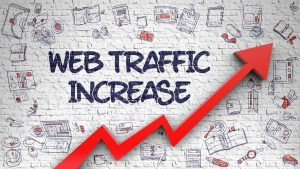The Pros and Cons of Popular Website Traffic Generators

The Pros and Cons of Popular Website Traffic Generators
In the ever-evolving digital landscape, website traffic is a crucial indicator of online success. As an SEO specialist, you’re constantly exploring new tools and strategies to increase your website’s visibility and attract more visitors. One approach that’s gained significant traction is a website traffic generator. While these tools can offer substantial benefits, they also have certain drawbacks. This article will provide an in-depth analysis of the pros and cons of popular website traffic generators, helping you make informed decisions about their use.
What Are Website Traffic Generators?
Website traffic generators are tools and strategies designed to increase the number of visits to a website. These generators can range from automated software programs to specific marketing techniques. The primary goal of using traffic generators is to drive more visitors to a website, thereby improving visibility, engagement, and, ultimately, conversions.
The Pros of Website Traffic Generators
1. Immediate Traffic Boost
Pro: One of the most significant advantages of using website traffic generators is the immediate boost in traffic they can provide. That can be particularly beneficial for new websites that need initial traction and visibility.
Example: A newly launched online store uses a traffic generator to attract visitors, creating the impression of a popular and active site. This initial boost can increase organic traffic as more users discover the site.
2. Enhanced Engagement Metrics
Pro: Traffic generators can improve engagement metrics, such as average session duration, pages per session, and click-through rates (CTR). These enhanced metrics can positively impact your website’s SEO and overall performance.
Example: A blog uses a traffic generator to increase the number of page views and the time visitors spend on the site. These improved metrics signal to search engines that the site offers valuable content, potentially leading to higher rankings.
3. Stress Testing for Better Performance
Pro: Using traffic generators for stress testing is a legitimate practice that helps identify potential performance bottlenecks. By simulating high traffic volumes, you can ensure your website remains stable and responsive during peak times.
Example: An e-commerce site preparing for a major sales event uses a traffic generator to simulate Black Friday traffic. This stress test helps the site’s developers identify and address performance issues, ensuring a smooth shopping experience for real users.
See also Turbo Media Site Demis Tech: Unveiling the Future of Tech Exploration
4. Cost-Effective Marketing
Pro: Many website traffic generators are cost-effective, offering a relatively inexpensive way to increase traffic compared to traditional paid advertising methods. That makes them an attractive option for small businesses and startups with limited budgets.
Example: A startup business uses a free traffic generator to drive visitors to its website, saving on marketing costs while achieving visibility and engagement.
The Cons of Website Traffic Generators
1. Risk of Detection and Penalties
Con: One of the most significant drawbacks of using website traffic generators is the risk of detection by search engines. Search engines like Google continuously improve their algorithms to identify unnatural traffic patterns. If detected, your website could face severe penalties, including lower search rankings or complete removal from search results.
Example: A website that uses a traffic generator to inflate visit numbers may experience a temporary boost in rankings. However, once Google detects the artificial traffic, the site could be penalized, resulting in a significant drop in rankings or even de-indexing.
2. Skewed Analytics Data
Con: Traffic generators can distort your website’s analytics data, making distinguishing between natural and artificial traffic challenging. This skewed data can lead to misguided decisions and ineffective marketing strategies.
Example: A site using a traffic generator may see inflated page views and session durations, making it difficult to identify genuine user behavior. As a result, the site owner might implement changes based on inaccurate data, leading to poor user experience and lower conversion rates.
3. High Bounce Rates
Con: If traffic generators are not well-designed, they may result in high bounce rates by leaving the site shortly after arriving. High bounce rates signal to search engines that your content is not engaging, negatively affecting your SEO.
Example: A poorly configured traffic generator visits a single page and bounces immediately, increasing the overall bounce rate. This behavior can harm the site’s reputation with search engines, leading to lower rankings.
4. Ethical and Legal Risks
Con: Using traffic generators to manipulate metrics or deceive stakeholders is unethical and potentially illegal. Engaging in such practices can lead to reputational damage, legal consequences, and loss of trust from users and clients.
Example: An ad network uses traffic generators to generate fake clicks on sponsored links. This deceptive practice could result in legal actions, fines, and a damaged reputation if detected.
See also From Novice to Expert: A Journey Through Checkpoint 156-215.81 Certification
Popular Website Traffic Generators: A Closer Look
Let’s examine some popular website traffic generators to provide a balanced view, highlighting their specific pros and cons.
1. TrafficBotPro
Overview: TrafficBotPro is a well-known traffic generator with comprehensive features and a user-friendly interface. It’s designed to generate high-quality traffic that mimics genuine user behavior.
Pros:
- Realistic Traffic Simulation: Advanced scripting capabilities ensure the generated traffic closely resembles user behavior.
- Customization: Offers customizable scripts for complex user interactions.
- Geo-Targeting: Ability to target specific geographical locations.
Cons:
- Risk of Detection: Despite its advanced features, there’s always a risk of being detected by search engines.
- Analytics Distortion: Potential to skew website analytics data.
Example Use Case: A new online magazine uses TrafficBotPro to simulate user traffic from different regions, assess server performance, and optimize site speed.
2. SeekersBot
Overview: SeekersBot is known for its advanced machine-learning algorithms that enhance the realism of simulated traffic. It’s designed to boost website traffic while providing detailed analytics on user interactions.
Pros:
- Enhanced Realism: Machine learning algorithms result in more accurate simulation of fundamental user interactions.
- Insightful Analytics: Detailed reports help understand and optimize user experience.
- Multi-Platform Support: Compatible with various content management systems (CMS) and e-commerce platforms.
Cons:
- Complexity: It may require a learning curve to utilize its advanced features fully.
- Cost: Some advanced features may require a paid subscription while offering a free version.
Example Use Case: A blog owner uses SeekersBot to simulate diverse readership patterns and gather insights into which content formats drive the most engagement.
3. TrafficMaster360
Overview: TrafficMaster360 is a versatile traffic generator offering various features to generate and manage website traffic effectively. It’s particularly well-regarded for its security features and anti-detection mechanisms.
Pros:
- High Security: Robust security features reduce the risk of detection and penalties.
- Behavior Randomization: Randomizes user actions to simulate authentic interactions.
- Dynamic IP Pool: Regularly updated pool of IP addresses to avoid detection.
Cons:
- Cost: Advanced security features and randomization options may come at a higher price.
- Potential for Misuse: If not used ethically, it can lead to misleading metrics and legal issues.
Example Use Case: A marketing agency uses TrafficMaster360 to simulate traffic spikes during campaign launches, ensuring the client’s website can handle increased loads.
See also Reduce Server Response Time With A Dedicated Server In Germany
Best Practices for Using Website Traffic Generators
To leverage the benefits of website traffic generators while mitigating the risks. It’s essential to follow best practices. Here are some guidelines for responsible usage:
1. Transparency and Disclosure
Always be transparent with stakeholders about the use of traffic generators. Communicate their purpose, benefits, and potential risks. Transparency builds trust and ensures that everyone understands the strategy.
Example: Inform clients about using traffic generators to stress-test the website’s server capacity, explaining that this is a standard practice to ensure site stability.
2. Avoiding Deceptive Practices
Using traffic generators to deceive or manipulate metrics is unethical and can harm your reputation. Avoid actions that mislead stakeholders or distort data analytics.
Example: Use traffic generators responsibly, focusing on genuine growth and long-term success rather than short-term gains through deception.
3. Compliance with Regulations
Adhering to legal regulations and industry guidelines is crucial. Ensure that your use of traffic generators complies with all relevant laws and best practices.
Example: Stay informed about legal requirements and ensure that your use of traffic generators adheres to industry standards.
4. Maintaining Data Integrity
Monitor and clean your analytics data regularly to distinguish between bot and genuine traffic. Use traffic generators strategically to supplement real traffic rather than replace it.
Example: Implement filters and audits to ensure data accuracy, making informed decisions based on genuine user behavior.
Conclusion
Website traffic generators can offer significant benefits, such as immediate traffic boosts, enhanced engagement metrics, stress testing, and cost-effective marketing. However, they also come with notable drawbacks, including the risk of detection, skewed analytics data, high bounce rates, and ethical and legal risks.
As an SEO specialist, it’s essential to weigh the pros and cons of website traffic generators https://www.sparktraffic.com/website-traffic-generator. You can use these tools responsibly and legitimately by following best practices and maintaining ethical standards. Transparency, avoiding deceptive practices, complying with regulations, and maintaining data integrity is crucial to ensuring that your use of traffic generators supports sustainable growth and long-term success in the competitive digital landscape.





